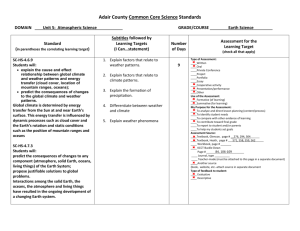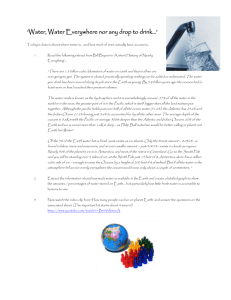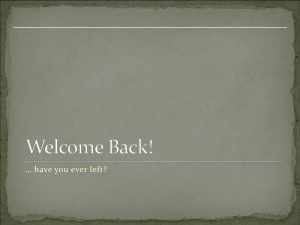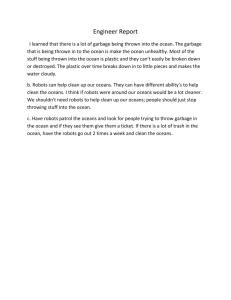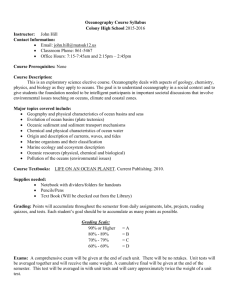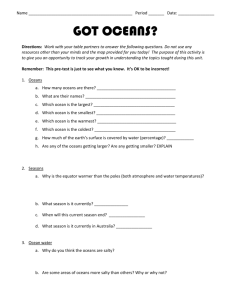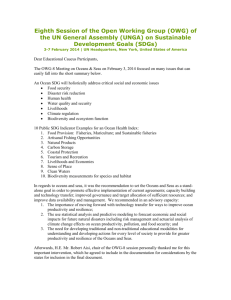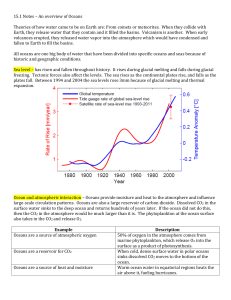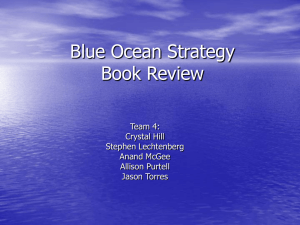TEXTS 5 – C, D Read the texts. Answer the questions. Choose any
advertisement
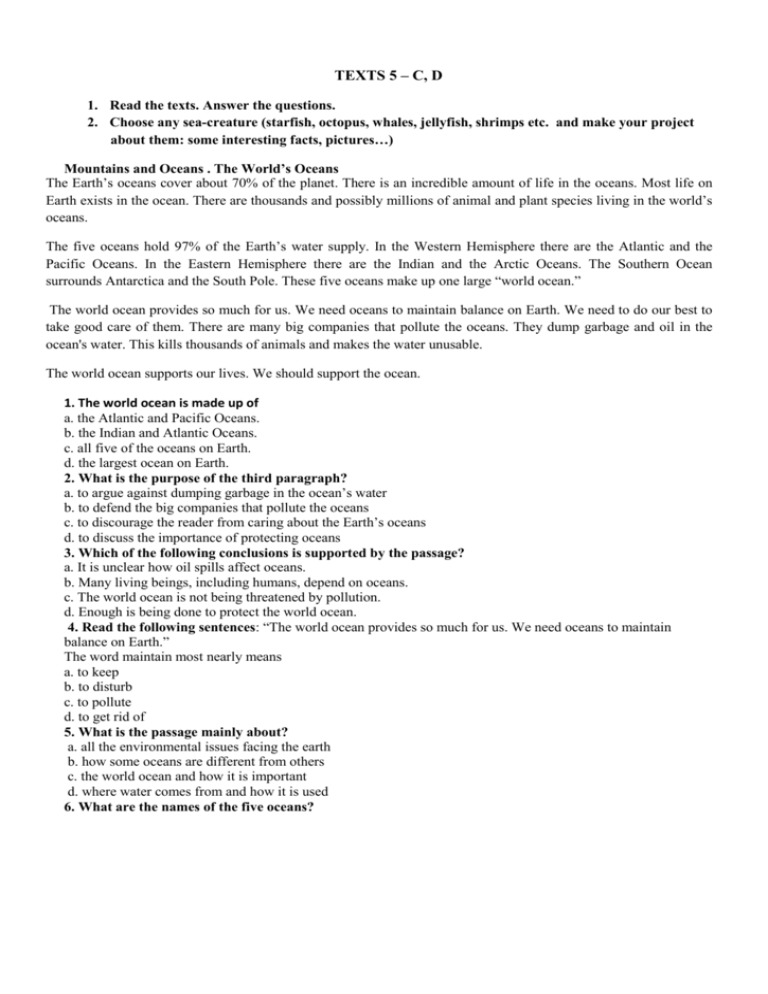
TEXTS 5 – C, D 1. Read the texts. Answer the questions. 2. Choose any sea-creature (starfish, octopus, whales, jellyfish, shrimps etc. and make your project about them: some interesting facts, pictures…) Mountains and Oceans . The World’s Oceans The Earth’s oceans cover about 70% of the planet. There is an incredible amount of life in the oceans. Most life on Earth exists in the ocean. There are thousands and possibly millions of animal and plant species living in the world’s oceans. The five oceans hold 97% of the Earth’s water supply. In the Western Hemisphere there are the Atlantic and the Pacific Oceans. In the Eastern Hemisphere there are the Indian and the Arctic Oceans. The Southern Ocean surrounds Antarctica and the South Pole. These five oceans make up one large “world ocean.” The world ocean provides so much for us. We need oceans to maintain balance on Earth. We need to do our best to take good care of them. There are many big companies that pollute the oceans. They dump garbage and oil in the ocean's water. This kills thousands of animals and makes the water unusable. The world ocean supports our lives. We should support the ocean. 1. The world ocean is made up of a. the Atlantic and Pacific Oceans. b. the Indian and Atlantic Oceans. c. all five of the oceans on Earth. d. the largest ocean on Earth. 2. What is the purpose of the third paragraph? a. to argue against dumping garbage in the ocean’s water b. to defend the big companies that pollute the oceans c. to discourage the reader from caring about the Earth’s oceans d. to discuss the importance of protecting oceans 3. Which of the following conclusions is supported by the passage? a. It is unclear how oil spills affect oceans. b. Many living beings, including humans, depend on oceans. c. The world ocean is not being threatened by pollution. d. Enough is being done to protect the world ocean. 4. Read the following sentences: “The world ocean provides so much for us. We need oceans to maintain balance on Earth.” The word maintain most nearly means a. to keep b. to disturb c. to pollute d. to get rid of 5. What is the passage mainly about? a. all the environmental issues facing the earth b. how some oceans are different from others c. the world ocean and how it is important d. where water comes from and how it is used 6. What are the names of the five oceans? 7. Based on the passage, why are the oceans important? 8. The question below is an incomplete sentence. Choose the answer that best completes the sentence. The oceans are very important to life on Earth __________ so many plants and animals live in the ocean. a. although b. thus c. therefore d. because 9. Read the following sentence. Many big companies have polluted oceans by dumping garbage and oil into the water. Answer the questions below based on the information provided in the sentence you just read. One of the questions has already been answered for you. What? many big companies Have done what? __________________________________________________ How? ___________________________________________________________ 10. Vocabulary Word: incredible (adj.): very surprising or impressive. Use the vocabulary word in a sentence: ________________________________ What’s the Big Idea about Water? : Protecting Our Water Humans Put Water to Work You've probably had a drink of water or washed your hands today. But people use water for so many other purposes, like cleaning stuff, transportation, and generating hydroelectric power. Just as nothing can live without water, not much can be made without it, from candy to cotton T-shirts. Because water is so useful, most people live along coastlines, rivers, and lakes. Where fresh water is limited, people have used many technologies—like wells, dams, and canals—to store and move it. Sometimes these technologies damage habitats. Other species have to compete with humans for water. This may help explain why so many creatures that live in fresh water are endangered. We need to be smarter and more careful about how we use water in order to make sure that there's enough for all life on Earth. We Need to Take Care of the Water Planet. Water is precious. We can't get more. How do we make sure there is enough clean, fresh water to share with all living things? Remember that every drop we use—or waste—continues through the water cycle. Stuff we put down the drain ends up in someone—or something—else's water. Chemicals like fertilizers and pesticides pollute lakes and oceans, harming the organisms that live in them. We need to protect swamps and riverbanks. These wetlands clean water naturally and provide important habitats for many wild birds, fish, and other species. People are working to restore damaged or lost wetlands. We can use water more wisely. For example, it takes a lot of energy to produce bottled water, and not everyone recycles the plastic bottles. We can use less, too, in simple ways like drinking tap water and turning off the faucet while we brush our teeth. Together, we can protect fresh water now and for the future.
